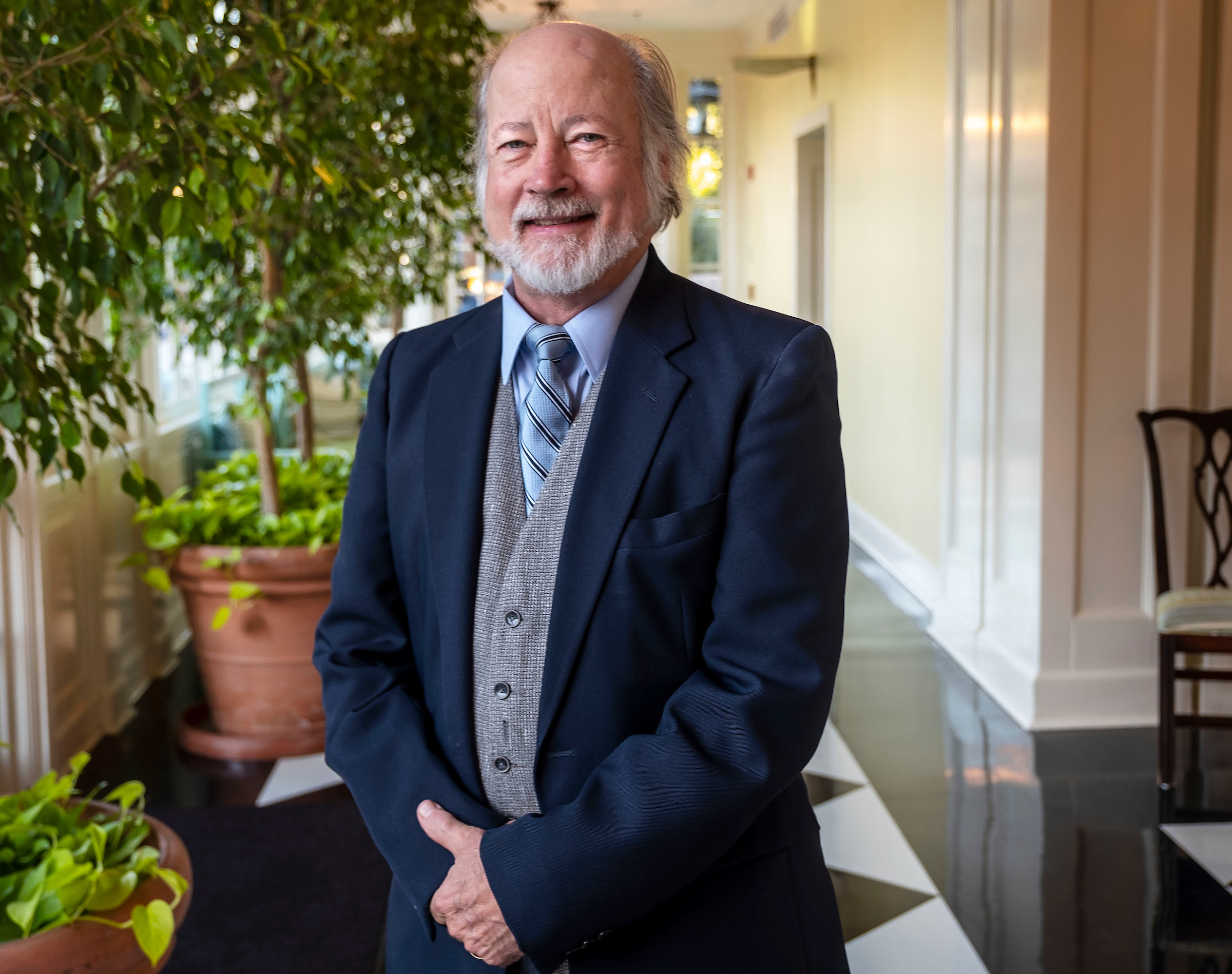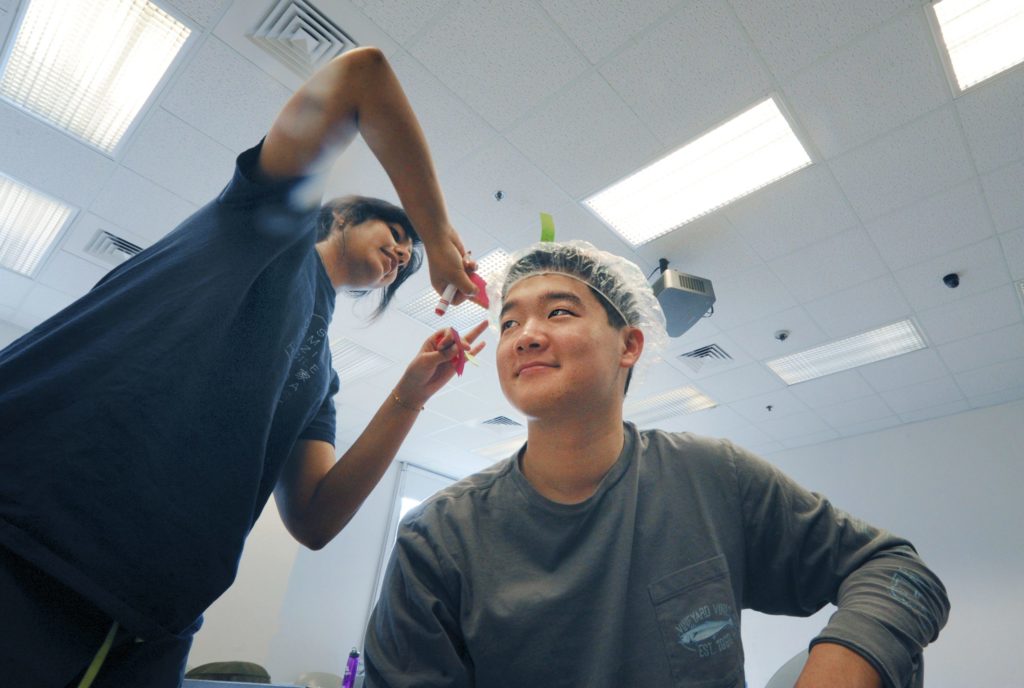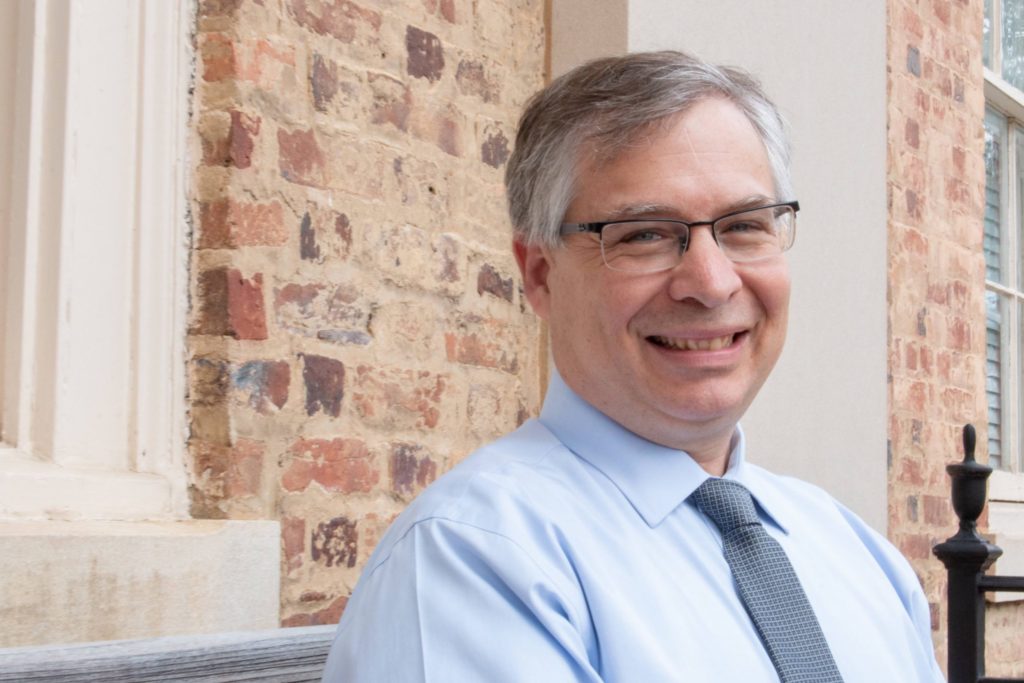
(Jon Gardiner/UNC-Chapel Hill)
When English professor and writer Bland Simpson was just a little boy, he accompanied his grandfather Julius Andrews Page Sr. on long strolls across Polk Place on the Carolina campus. They would walk from building to building where his Granddaddy Page would discuss such arcane things as mortar joints in intricate detail.
He was too young to understand what a university was, Simpson said, and his grandfather’s familiarity with all the buildings they visited led Simpson to believe he owned them. Simpson later learned that his grandfather knew so much about buildings because he was the superintendent of construction for the firm that built many of them.
One of Page’s first projects in 1924–25 was to transform Smith Hall, which was once a ballroom, a library and the building where in the spring of 1865 Union cavalry stabled its horses, into Playmakers Theatre. Page went on to build Kenan Stadium, the Bell Tower, the new Memorial Hall and Wilson Library, which his grandfather considered the heart and soul of the campus because it exemplifies knowledge and learning.
Simpson was a boy when his grandfather showed him the invisible patch in one of the six Corinthian columns on the east corner of Wilson. The patch covers the five-inch chip gouged from the column section as it was rolled into place from a railroad track.
When his grandfather saw that chip, he directed a team of Italian stone masons to fix it, said Simpson, the Kenan Distinguished Professor of English who began teaching creative writing at his alma mater in 1982.
All these years later, Simpson said, it is still a magical experience to walk by Wilson Library and other campus buildings that he first visited with his grandfather years ago. And on University Day, Simpson forged a new connection between his grandfather’s work and his own when he received the 2018 Edward Kidder Graham Faculty Service Award.
His grandfather also helped build Graham Memorial, which opened in 1931 to honor Edward Kidder Graham, the progressive young University president who died in the influenza epidemic of 1918. The award recognizes Graham’s call to public service and his vision of the campus being “coterminous” with the borders of the state.
Simpson said it was a great honor to win an award named for one of his favorite University leaders.
“I am very glad that Edward Kidder Graham focused the phrase ‘service to the state’ so clearly,” Simpson said, “to remind us even today that is why we are here. It’s always there in your heart.”
A writer’s eye, a musician’s ear
Over the past four decades, Simpson’s influence—as an English teacher, a writer, a songwriter and a “honky-tonk piano player” with the Red Clay Ramblers—has spread many times over throughout the state. But the wellspring of inspiration for much his work has been and will always be the coastal plains.
Simpson grew up in Elizabeth City and spent much time as a boy around Albemarle Sound before his family moved to Chapel Hill. Starting with The Great Dismal, A Carolinian’s Swamp Memoir (UNC Press, 1990) he began writing what would become a collection of books that together chronicled the history, culture, geography and mysteries of the coastal region with an encyclopedic depth.
Historian Jack Temple said of his work, “Simpson has read his anthropology, geology, zoology and botany well, and cleverly concealed it.”
He also brings to his work a writer’s eye for uncovering a good story and a musician’s ear for telling it. Lucinda H. MacKethan, professor emerita of English at N.C. State, said, “Bland’s storytelling voice springs out of his writings as well as his songs — you hear his words on the page more than you read them.”
Many of his books, from Into the Sound Country, A Carolinian’s Coastal Plain (UNC Press, 1997) to Little Rivers & Waterway Tales, A Carolinian’s Eastern Streams (UNC Press, 2015), feature the photography of his wife, Ann, who has said of her lifelong collaborator, “He always has a way of telling stories that connect people to things or places or ideas.”
‘Lucky in every direction’
Yet, Simpson readily acknowledges, he did not start out with a plan to write any of those books. “All of it was just a happy accident. It was luck,” he said.
He created much of that luck, he will tell you, simply by following the advice of people who had better sense than he did about what he should do at critical points of his career.
It began with the Ed Freeman, record producer for Don McClean’s American Pie who told him to leave New York City and go home to write North Carolina songs for a record.
“It was some of the best advice I’ve ever gotten in my life,” Simpson said, and he took it, but ended up writing a book about music instead. That book, Heart of the Country: A Novel of Southern Music, led to a teaching offer from Max Steele, director of the creative writing program in Carolina’s English department.
It was only a temporary gig, Steele told him, yet Steele kept inviting him back one semester, then one year, at a time. During this period, he ran into David Perry, an old college buddy who happened to be a senior editor at UNC Press, who planted the
idea in his head to write about the place he knew and cared about the most—eastern North Carolina.
Simpson did not act on Perry’s suggestion right away, but several years later, he began work on what would become The Great Dismal. After the success of that first book, Simpson told Perry he was eager to write more about the east. Perry happily obliged.
“I am lucky in every direction,” Simpson said. “I don’t really know anyone luckier than I am, and I count every one of those blessings all the time.”
‘You are the University’
When Simpson returned to Carolina’s English department in 1989, after several years of musical touring, he eventually won the tenured and endowed position he still holds. Another bit of good fortune was getting an office next to the late Doris Betts who, along with office-mate professor Jerry Leath Mills, Simpson said, taught him everything he would ever need to know about how to go about being a writer and a teacher while making time to give back to his students and the people around the state.
“We all learned from her. ‘You couldn’t do everything,’ she said, ‘but if you could, it was better to say yes than to say no.’”
Simpson remembers the pep talk Betts gave him when he was feeling nervous about going to speak to a group in a small town miles from campus. “I am not famous,” Simpson told her. “None of them will know who I am.”
It didn’t matter, Betts told him.
“When you walk into that room, they will see you as the University,” Betts told him. “You will have an enormous blue flag behind you. Let that give you confidence wherever you go.”
Ever since, whenever he has gone somewhere to speak, Simpson understood, whether he said greetings from Chapel Hill or not, that was exactly what he was doing.
“That is a great privilege,” Simpson said, “and it is a great responsibility.”
By Gary Moss, University Gazette




